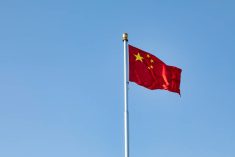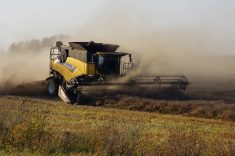Winnipeg | Reuters –– China has delayed implementing a tougher standard on Canadian canola shipments, just days before it was to take effect, as a result of talks between the two countries, a Chinese government spokesperson said.
China’s new standard for foreign material in canola shipments will take effect Sept. 1 instead of April 1, Counsellor Yang Yundong, the spokesperson of the Chinese Embassy in Ottawa, said in an email to Reuters late Monday.
The new standard will allow no more than one per cent foreign material, such as straw and other plant seeds, per shipment, compared with the current maximum of 2.5 per cent.
Read Also

Pulse Weekly: Spike in yellow peas slowing
Although the price increases for Canadian yellow peas have started to slow, there could be more of the peas planted come spring, said Kress Schmidt, broker with Johnston Grains in Calgary.
Canada disagrees with the position that the new standard is needed. The Chinese Embassy spokesperson said his government hoped Canada would take “effective measures so that the issue could be resolved at an early date.”
The spokesperson said the change would reduce the risk of blackleg disease, caused by a fungus common in Canada, from spreading in China.
“The measures taken by the relevant Chinese authorities for that purpose are very much science-based and reasonable,” the spokesperson said.
The Canola Council of Canada says there is no significant risk of spreading the disease through foreign material in shipments. Canadian Agriculture Minister Lawrence MacAulay urged China this month to base its decision on scientific factors.
The Canola Council, whose directors include farmers as well as exporters Cargill and Richardson International, said there is no significant risk of spreading the disease through foreign material.
The next five months will be spent on research to confirm its position, council president Patti Miller said.
“For (exporters) who had made sales out into the future, they’ll be able to trade based on current terms, and that’s very welcome,” she said. “We’re solid on what we believe the scientific results are.”
MacAulay, in a statement Tuesday, said export conditions to China “remain unchanged” and Canadian and Chinese officials “continue to work on a permanent, science-based solution.”
Canada is the world’s biggest canola producer, and China is its biggest canola export market.
Some traders in both countries have said they believe China’s main motivation for the new standard is a desire to slow imports due to its large domestic rapeseed oil stocks.
China’s quarantine authority, AQSIQ, told the Canadian government in February that it was planning the new measure, causing a short-term drop in ICE Canada canola futures.
Despite the delay, Canadian exporters are reluctant to book new sales to China, said one Canadian canola futures broker.
— Rod Nickel is a Reuters correspondent covering the agriculture and mining sectors from Winnipeg. Includes files from AGCanada.com Network staff.















